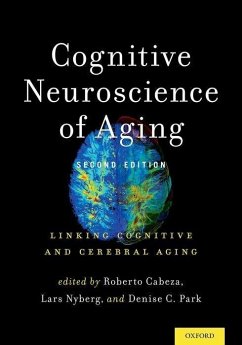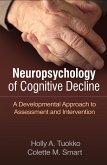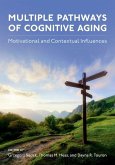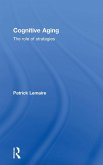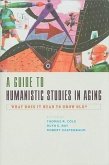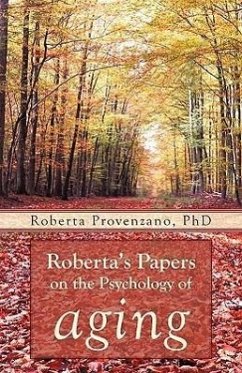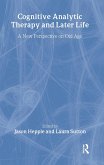Cognitive Neuroscience of Aging
Linking Cognitive and Cerebral Aging
Herausgeber: Cabeza, Roberto; Park, Denise C; Nyberg, Lars
Cognitive Neuroscience of Aging
Linking Cognitive and Cerebral Aging
Herausgeber: Cabeza, Roberto; Park, Denise C; Nyberg, Lars
- Gebundenes Buch
- Merkliste
- Auf die Merkliste
- Bewerten Bewerten
- Teilen
- Produkt teilen
- Produkterinnerung
- Produkterinnerung
This second edition of the popular Cognitive Neuroscience of Aging provides up-to-date coverage of the most fundamental topics in this discipline. It accessibly and comprehensively reviews the neural mechanisms of cognitive aging appropriate to both professionals and students in a variety of domains, including psychology, neuroscience, neuropsychology, neurology, and psychiatry.
Andere Kunden interessierten sich auch für
![Neuropsychology of Cognitive Decline Neuropsychology of Cognitive Decline]() Holly A TuokkoNeuropsychology of Cognitive Decline67,99 €
Holly A TuokkoNeuropsychology of Cognitive Decline67,99 €![Ageing and Older Adult Mental Health Ageing and Older Adult Mental Health]() Ageing and Older Adult Mental Health151,99 €
Ageing and Older Adult Mental Health151,99 €![Multiple Pathways of Cognitive Aging Multiple Pathways of Cognitive Aging]() Multiple Pathways of Cognitive Aging115,99 €
Multiple Pathways of Cognitive Aging115,99 €![Cognitive Aging Cognitive Aging]() Patrick LemaireCognitive Aging206,99 €
Patrick LemaireCognitive Aging206,99 €![A Guide to Humanistic Studies in Aging A Guide to Humanistic Studies in Aging]() A Guide to Humanistic Studies in Aging66,99 €
A Guide to Humanistic Studies in Aging66,99 €![Roberta's Papers on the Psychology of Aging Roberta's Papers on the Psychology of Aging]() Roberta ProvenzanoRoberta's Papers on the Psychology of Aging17,99 €
Roberta ProvenzanoRoberta's Papers on the Psychology of Aging17,99 €![Cognitive Analytic Therapy and Later Life Cognitive Analytic Therapy and Later Life]() Jason Hepple / Laura Sutton (eds.)Cognitive Analytic Therapy and Later Life91,99 €
Jason Hepple / Laura Sutton (eds.)Cognitive Analytic Therapy and Later Life91,99 €-
-
-
This second edition of the popular Cognitive Neuroscience of Aging provides up-to-date coverage of the most fundamental topics in this discipline. It accessibly and comprehensively reviews the neural mechanisms of cognitive aging appropriate to both professionals and students in a variety of domains, including psychology, neuroscience, neuropsychology, neurology, and psychiatry.
Hinweis: Dieser Artikel kann nur an eine deutsche Lieferadresse ausgeliefert werden.
Hinweis: Dieser Artikel kann nur an eine deutsche Lieferadresse ausgeliefert werden.
Produktdetails
- Produktdetails
- Verlag: Hurst & Co.
- 2nd edition
- Seitenzahl: 616
- Erscheinungstermin: 28. November 2016
- Englisch
- Abmessung: 259mm x 185mm x 46mm
- Gewicht: 1474g
- ISBN-13: 9780199372935
- ISBN-10: 0199372934
- Artikelnr.: 47866079
- Herstellerkennzeichnung
- Libri GmbH
- Europaallee 1
- 36244 Bad Hersfeld
- gpsr@libri.de
- Verlag: Hurst & Co.
- 2nd edition
- Seitenzahl: 616
- Erscheinungstermin: 28. November 2016
- Englisch
- Abmessung: 259mm x 185mm x 46mm
- Gewicht: 1474g
- ISBN-13: 9780199372935
- ISBN-10: 0199372934
- Artikelnr.: 47866079
- Herstellerkennzeichnung
- Libri GmbH
- Europaallee 1
- 36244 Bad Hersfeld
- gpsr@libri.de
Roberto Cabeza is Professor of Psychology and Neuroscience at Duke University, where he is also Director of the Center for Cognitive Neuroscience. Cabeza investigates the neural mechanisms of memory in young and older adults using behavioral, functional neuroimaging, and brain stimulation techniques. Lars Nyberg is professor at Umeå University, Sweden (in Psychology until 2005, and in Neuroscience since 2006) and director of Umeå å Center for Functional Brain Imaging. He is a principal investigator of the Betula longitudinal project. Denise C. Park is Distinguished University Chair of Behavioral and Brain Science at the University of Texas at Dallas. She has held numerous offices in national professional organizations and is a fellow of AAAS, American Psychological Association, American Psychological Society, and Gerontological Society of America. Park has received the Distinguished Scientific Contribution Award (2002) and the Distinguished Mentor Award (2015) from the Division of Adult Development and Aging of the American Psychological Association. She has studied the aging mind her entire career and is presently focused on techniques for enhancing cognitive function through neuroplasticity and understanding the transition from cognitive health to Alzheimer's disease.
* Contributors
* Introduction
* I. Methods and Issues
* 1. MRI measures of aging: methodological issues
* Hanzhang Lu and Peiying Liu
* 2. Molecular imaging of aging and neurodegenerative disease
* Anna Rieckmann, Randy L. Buckner and Trey Hedden
* 3. Age differences in structural connectivity: DTI and WMHs
* David J. Madden and Emily L. Parks
* 4. Age differences in functional connectivity at rest and during
cognitive tasks
* Cheryl L. Grady
* 5. Multi-modal imaging of the aging brain
* Anders M. Fjell and Kristine B. Walhovd
* 6. Structural and functional imaging of aging: longitudinal studies
* Lars Nyberg, Sara Pudas, and Anders Lundquist
* 7. Interpreting age-related differences in memory-related neural
activity
* Michael D. Rugg
* II. Cognitive Processes
* 8. Selective attention and inhibitory control in the aging brain
* Theodore P. Zanto and Adam Gazzaley
* 9. Working memory and executive functions in the aging brain
* Patricia A. Reuter-Lorenz and Cindy Lustig
* 10. Neural correlates of age-related slowing
* Timothy A. Salthouse
* 11. The aging hippocampus: linking animal and human research
* Shauna M. Stark and Craig E. L. Stark
* 12. Episodic memory encoding and retrieval in the aging brain
* Wei-Chun Wang and Roberto Cabeza
* 13. Emotion and emotional memory
* Elizabeth A. Kensinger and Jaclyn H. Ford
* III. Health and disease
* 14. The middle-aged brain: A cognitive neuroscience perspective
* Denise C. Park and Sara B. Festini
* 15. The modifying role of hypertension in cognitive and brain aging
* Karen M. Rodrigue and Gerard N. Bischof
* 16. Genetics and cognitive neuroscience of aging
* Goren Papenberg, Ulman Lindenberger and Lars Backman
* 17. Effects of exercise on cognition, brain structure, and brain
function in older adults
* Kirk I. Erickson and Lauren E. Oberlin
* 18. The link of intellectual engagement to cognitive and brain aging.
* Martin Lövdén, Lars Backman and Ulman Lindenberger
* 19. Disambiguating preclinical Alzheimer's disease from cognitive
aging
* Reisa Sperling
* 20. Late-Life Depression: Translating Neurobiological Hypotheses into
novel treatments.
* George S. Alexopoulos and Robert E. Kelly
* Index
* Introduction
* I. Methods and Issues
* 1. MRI measures of aging: methodological issues
* Hanzhang Lu and Peiying Liu
* 2. Molecular imaging of aging and neurodegenerative disease
* Anna Rieckmann, Randy L. Buckner and Trey Hedden
* 3. Age differences in structural connectivity: DTI and WMHs
* David J. Madden and Emily L. Parks
* 4. Age differences in functional connectivity at rest and during
cognitive tasks
* Cheryl L. Grady
* 5. Multi-modal imaging of the aging brain
* Anders M. Fjell and Kristine B. Walhovd
* 6. Structural and functional imaging of aging: longitudinal studies
* Lars Nyberg, Sara Pudas, and Anders Lundquist
* 7. Interpreting age-related differences in memory-related neural
activity
* Michael D. Rugg
* II. Cognitive Processes
* 8. Selective attention and inhibitory control in the aging brain
* Theodore P. Zanto and Adam Gazzaley
* 9. Working memory and executive functions in the aging brain
* Patricia A. Reuter-Lorenz and Cindy Lustig
* 10. Neural correlates of age-related slowing
* Timothy A. Salthouse
* 11. The aging hippocampus: linking animal and human research
* Shauna M. Stark and Craig E. L. Stark
* 12. Episodic memory encoding and retrieval in the aging brain
* Wei-Chun Wang and Roberto Cabeza
* 13. Emotion and emotional memory
* Elizabeth A. Kensinger and Jaclyn H. Ford
* III. Health and disease
* 14. The middle-aged brain: A cognitive neuroscience perspective
* Denise C. Park and Sara B. Festini
* 15. The modifying role of hypertension in cognitive and brain aging
* Karen M. Rodrigue and Gerard N. Bischof
* 16. Genetics and cognitive neuroscience of aging
* Goren Papenberg, Ulman Lindenberger and Lars Backman
* 17. Effects of exercise on cognition, brain structure, and brain
function in older adults
* Kirk I. Erickson and Lauren E. Oberlin
* 18. The link of intellectual engagement to cognitive and brain aging.
* Martin Lövdén, Lars Backman and Ulman Lindenberger
* 19. Disambiguating preclinical Alzheimer's disease from cognitive
aging
* Reisa Sperling
* 20. Late-Life Depression: Translating Neurobiological Hypotheses into
novel treatments.
* George S. Alexopoulos and Robert E. Kelly
* Index
* Contributors
* Introduction
* I. Methods and Issues
* 1. MRI measures of aging: methodological issues
* Hanzhang Lu and Peiying Liu
* 2. Molecular imaging of aging and neurodegenerative disease
* Anna Rieckmann, Randy L. Buckner and Trey Hedden
* 3. Age differences in structural connectivity: DTI and WMHs
* David J. Madden and Emily L. Parks
* 4. Age differences in functional connectivity at rest and during
cognitive tasks
* Cheryl L. Grady
* 5. Multi-modal imaging of the aging brain
* Anders M. Fjell and Kristine B. Walhovd
* 6. Structural and functional imaging of aging: longitudinal studies
* Lars Nyberg, Sara Pudas, and Anders Lundquist
* 7. Interpreting age-related differences in memory-related neural
activity
* Michael D. Rugg
* II. Cognitive Processes
* 8. Selective attention and inhibitory control in the aging brain
* Theodore P. Zanto and Adam Gazzaley
* 9. Working memory and executive functions in the aging brain
* Patricia A. Reuter-Lorenz and Cindy Lustig
* 10. Neural correlates of age-related slowing
* Timothy A. Salthouse
* 11. The aging hippocampus: linking animal and human research
* Shauna M. Stark and Craig E. L. Stark
* 12. Episodic memory encoding and retrieval in the aging brain
* Wei-Chun Wang and Roberto Cabeza
* 13. Emotion and emotional memory
* Elizabeth A. Kensinger and Jaclyn H. Ford
* III. Health and disease
* 14. The middle-aged brain: A cognitive neuroscience perspective
* Denise C. Park and Sara B. Festini
* 15. The modifying role of hypertension in cognitive and brain aging
* Karen M. Rodrigue and Gerard N. Bischof
* 16. Genetics and cognitive neuroscience of aging
* Goren Papenberg, Ulman Lindenberger and Lars Backman
* 17. Effects of exercise on cognition, brain structure, and brain
function in older adults
* Kirk I. Erickson and Lauren E. Oberlin
* 18. The link of intellectual engagement to cognitive and brain aging.
* Martin Lövdén, Lars Backman and Ulman Lindenberger
* 19. Disambiguating preclinical Alzheimer's disease from cognitive
aging
* Reisa Sperling
* 20. Late-Life Depression: Translating Neurobiological Hypotheses into
novel treatments.
* George S. Alexopoulos and Robert E. Kelly
* Index
* Introduction
* I. Methods and Issues
* 1. MRI measures of aging: methodological issues
* Hanzhang Lu and Peiying Liu
* 2. Molecular imaging of aging and neurodegenerative disease
* Anna Rieckmann, Randy L. Buckner and Trey Hedden
* 3. Age differences in structural connectivity: DTI and WMHs
* David J. Madden and Emily L. Parks
* 4. Age differences in functional connectivity at rest and during
cognitive tasks
* Cheryl L. Grady
* 5. Multi-modal imaging of the aging brain
* Anders M. Fjell and Kristine B. Walhovd
* 6. Structural and functional imaging of aging: longitudinal studies
* Lars Nyberg, Sara Pudas, and Anders Lundquist
* 7. Interpreting age-related differences in memory-related neural
activity
* Michael D. Rugg
* II. Cognitive Processes
* 8. Selective attention and inhibitory control in the aging brain
* Theodore P. Zanto and Adam Gazzaley
* 9. Working memory and executive functions in the aging brain
* Patricia A. Reuter-Lorenz and Cindy Lustig
* 10. Neural correlates of age-related slowing
* Timothy A. Salthouse
* 11. The aging hippocampus: linking animal and human research
* Shauna M. Stark and Craig E. L. Stark
* 12. Episodic memory encoding and retrieval in the aging brain
* Wei-Chun Wang and Roberto Cabeza
* 13. Emotion and emotional memory
* Elizabeth A. Kensinger and Jaclyn H. Ford
* III. Health and disease
* 14. The middle-aged brain: A cognitive neuroscience perspective
* Denise C. Park and Sara B. Festini
* 15. The modifying role of hypertension in cognitive and brain aging
* Karen M. Rodrigue and Gerard N. Bischof
* 16. Genetics and cognitive neuroscience of aging
* Goren Papenberg, Ulman Lindenberger and Lars Backman
* 17. Effects of exercise on cognition, brain structure, and brain
function in older adults
* Kirk I. Erickson and Lauren E. Oberlin
* 18. The link of intellectual engagement to cognitive and brain aging.
* Martin Lövdén, Lars Backman and Ulman Lindenberger
* 19. Disambiguating preclinical Alzheimer's disease from cognitive
aging
* Reisa Sperling
* 20. Late-Life Depression: Translating Neurobiological Hypotheses into
novel treatments.
* George S. Alexopoulos and Robert E. Kelly
* Index

